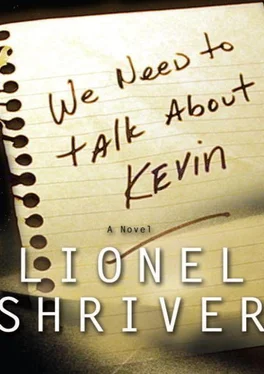You would indeed come home—this once. But when I put the phone down, it registered with a whispered click: There could yet come a day when you did not.
Thus instead of going slack and infinite, time still felt frantically short. When you walked in you were so tired you could hardly speak. I let you skip dinner, but I would not let you sleep. I have experienced my share of burning sexual desire, and I can assure you that this was an urgency of another order. I wanted to arrange a backup, for you and for us, like slipping a carbon in my IBM Selectric. I wanted to make sure that if anything happened to either of us there would be something left beside socks. Just that night I wanted a baby stuffed in every cranny like money in jars, like hidden bottles of vodka for weak-willed alcoholics.
“I didn’t put in my diaphragm,” I mumbled when we were through.
You stirred. “Is it dangerous?”
“It’s very dangerous,” I said. Indeed, just about any stranger could have turned up nine months later. We might as well have left the door unlocked.
The next morning, you said while we dressed, “Last night—you didn’t just forget?” I shook my head, pleased with myself. “Are you sure about this?”
“Franklin, we’re never going to be sure. We have no idea what it’s like to have a kid. And there’s only one way to find out.”
You reached under my arms and lifted me overhead, and I recognized your lit-up expression from when you’d played “airplane” with Brian’s daughters. “Fantastic!”
I had sounded so confident, but when you brought me in for a landing I started to panic. Complacency has a way of restoring itself of its own accord, and I’d already stopped worrying whether you would live through the week. What had I done ? When later that month I got my period, I told you I was disappointed. That was my first lie, and it was a whopper.
During the following six weeks you applied yourself nightly. You liked having a job to do and bedded me with the same boisterous ifyou’re-going-to-do-anything-do-it-right with which you had knocked up our bookshelves. Myself, I wasn’t so sure about this yeomanlike fucking. I had always fancied the frivolousness of sex, and I liked it down and dirty. The fact that even the Armenian Orthodox Church would now look on with hearty approval could put me right out of the mood.
Meanwhile, I came to regard my body in a new light. For the first time I apprehended the little mounds on my chest as teats for the suckling of young, and their physical resemblance to udders on cows or the swinging distensions on lactating hounds was suddenly unavoidable. Funny how even women forget what breasts are for.
The cleft between my legs transformed as well. It lost a certain outrageousness, an obscenity, or achieved an obscenity of a different sort. The flaps seemed to open not to a narrow, snug dead end, but to something yawning. The passageway itself became a route to somewhere else, a real place, and not merely to a darkness in my mind. The twist of flesh in front took on a devious aspect, its inclusion overtly ulterior, a tempter, a sweetener for doing the species’ heavy lifting, like the lollipops I once got at the dentist.
Lo, everything that made me pretty was intrinsic to motherhood, and my very desire that men find me attractive was the contrivance of a body designed to expel its own replacement. I don’t want to pretend that I’m the first woman to discover the birds and the bees. But all this was new to me . And frankly, I wasn’t so sure about it. I felt expendable, throw-away, swallowed by a big biological project that I didn’t initiate or choose, that produced me but would also chew me up and spit me out. I felt used.
I’m sure you remember those fights about booze. According to you, I shouldn’t have been drinking at all. I balked. As soon as I discovered I was pregnant— I was pregnant, I didn’t go in for this we stuff—I’d go cold turkey. But conception could take years, during which I was not prepared to killjoy my every evening with glasses of milk. Multiple generations of women had tippled cheerfully through their pregnancies and what, did they all give birth to retards?
You sulked. You went quiet if I poured myself a second glass of wine, and your disapproving glances despoiled the pleasure (as they were meant to). Sullenly, you’d grumble that in my place you’d stop drinking, and yes, for years if necessary, about which I had no doubt. I would let parenthood influence our behavior; you would have parenthood dictate our behavior. If that seems a subtle distinction, it is night and day.
I was deprived that clichéd cinematic tip-off of heaving over the toilet, but it doesn’t appear to be in moviemakers’ interests to accept that some women don’t get morning sickness. Although you offered to accompany me with my urine sample, I dissuaded you: “It’s not as if I’m getting tested for cancer or something.” I remember the remark. Much like what they say in jest, it’s telling what people claim something is not .
At the gynecologist’s, I delivered my marinated artichoke jar, a briskness covering the intrinsic embarrassment of handing off smelly effluents to strangers, and waited in the office. Dr. Rhinestein—a cold young woman for her profession, with an aloof, clinical temperament that would have suited her better for pharmaceutical trials with rats—swept in ten minutes later and leaned over her desk to jot. “It’s positive,” she said crisply.
When she looked up, she did a double take. “Are you all right? You’ve turned white.”
I did feel strangely cold.
“Eva, I thought you were trying to get pregnant. This should be good news.” She said this severely, with reproach. I got the impression that if I wasn’t going to be happy about it, she would take my baby and give it to someone who’d got their mind right—who would hop up and down like a game-show contestant who’d won the car.
“Drop your head between your legs.” It seems I had begun to weave.
Once I had forced myself to sit up, if only because she seemed so bored, Dr. Rhinestein went through a long list of what I couldn’t do, what I couldn’t eat and drink, when I would —never mind my plans to update “WEEWAP,” as the office now called our Western European edition, thanks to you—return for my next appointment. This was my introduction to the way in which, crossing the threshold of motherhood, suddenly you become social property, the animate equivalent of a public park. That coy expression “you’re eating for two now, dear,” is all by way of goading that your very dinner is no longer a private affair; indeed, as the land of the free has grown increasingly coercive, the inference seems to run that “you’re eating for us now,” for 200-some million meddlers, any one of whose prerogative it is to object should you ever be in the mood for a jelly donut and not a full meal with whole grains and leafy vegetables that covers all five major food groups. The right to boss pregnant women around was surely on its way into the Constitution.
Dr. Rhinestein itemized recommended brands of vitamins and lectured on the dangers of continuing to play squash.
I had the afternoon to assemble myself into the glowing mother-to-be. Instinctively, I chose a plain cotton sundress more pert than sexy, then gathered the ingredients for a meal that was aggressively nutritious (the sautéed sea trout would be unbreaded, the salad would sport sprouts). In the meantime, I tried on different approaches to a shopworn scene: coy, delayed; bemused, artificially offhand; gushing— oh, darling! None of them seemed to suit. As I whisked about the loft twisting fresh candles into holders, I made a brave attempt at humming but could only think of show tunes from big-budget musicals like Hello, Dolly!
Читать дальше












